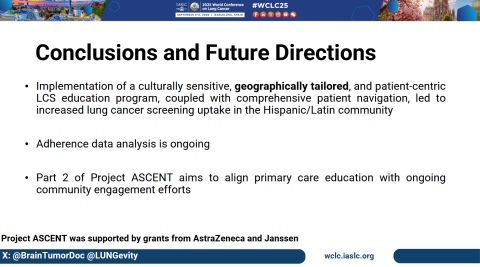Read time: 2 minutes.
Lung cancer remains the leading cause of cancer death, and for many communities, barriers like culture, language, and access make lifesaving screening even harder to reach. A new study, Project ASCENT, shows how tailored, culturally sensitive approaches can make a difference.
Presented at the 2025 World Conference on Lung Cancer by Dr. Manmeet Ahluwalia of the Miami Cancer Institute, the project focused on a population often underserved in preventive health measures—Hispanic and Latin communities in Miami.
LUNGevity Foundation, in partnership with Dr. Ahluwalia and his team at Miami Cancer Institute, developed a community engagement program to increase the uptake of lung cancer screening and the referrals to tobacco cessation programs. This program, designed with cultural sensitivity at its core, included metrics taken before and after rolling out the program to assess effectiveness.
The results were clear and encouraging. Screening rates and referrals improved, underscoring the value of meeting people where they are and addressing the social, cultural, and economic barriers that often stand in the way of accessing lung cancer screening.
This study adds to a growing body of evidence showing that culturally tailored strategies aren’t just thoughtful - they are effective.
More LUNGevity research from the 2025 World Conference on Lung Cancer:


